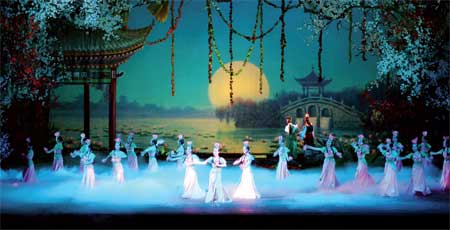China dreaming
The North Korean musical adaptation of ancient Chinese novel Hong Lou Meng or A Dream of Red Mansions, opens at Wednesday night in China after resounding success following its debut in September.
 |
|
Performers dancing on stage. [Global Times] |
At the invitation of Chinese Premier Wen Jiabao, A Dream of Red Mansions from the Pibada Opera Troupe will play at Beijing's BTV Theater from Wednesday until Sunday before touring to Hohhot, Changsha, Wuhan, Fuzhou, Shenzhen and Chongqing.
During Wen's visit to Pyongyang last year, he saw the musical with North Korean leader Kim Jong-il and liked it, according to a March report on xinhuanet.com.
Written by Cao Xueqin in the latter half of the 18th century, the novel Hong Lou Meng is among the four most famous Chinese classical literature works. It describes the life and fortunes of a large feudal family surnamed Jia and a tragic love story between Jia Baoyu, a descendant of the Jia clan and two of his cousins, Lin Daiyu and Xue Baochai.
The musical basically adheres to the original plot of the novel, Sung ln-deok, director of Pibada Opera Troupe was quoted in the xinhuanet.com report as saying. To better convey the tragic moods, the Chinese erhu was chosen as the main instrument for the music, he said.
The work has seen many adaptations of different forms since its inception including films, TV series and Yueju Opera (the second most popular opera in China). Tonight's performance is the first time that Chinese audiences will have the chance to see Pibada's current version, their second attempt at the masterpiece.
North Korea's late Chairman Kim ll-sung saw the Yueju Opera version during a visit to China in 1961, according to xinhuanet.com. He then came up with the idea of adapting it into a Korean musical. Fifty years later, his successor Kim Jong-il, also a fan of A Dream of Red Mansions, decided to have it remade, paying tribute to the friendship between China and North Korea.
Kim Jong-il personally advised on the current production, the report added.
The North Korean adaptation begins with melodious sounds and elegant dance in an extravagant Chinese setting, bringing the audience into a dreamy wonderland. By telling the heartbreaking love story between the main characters, the three-hour-long musical with six acts evokes strong resonance among its audiences, compassion for the personal tragedies and anger toward the corrupt feudalism, creative director Kim Young-rok was quoted in the report as saying.
Audiences, young and old, cry at the end when Lin Daiyu dies and Jia Baoyu leaves, he added.
 0
0 






